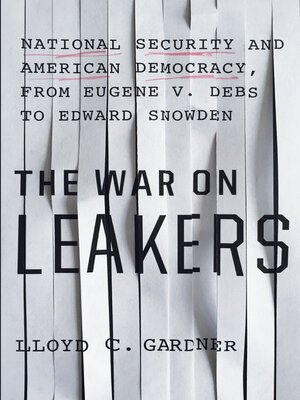The War on Leakers
ebook ∣ National Security and American Democracy, from Eugene V. Debs to Edward Snowden
By Lloyd C. Gardner

Sign up to save your library
With an OverDrive account, you can save your favorite libraries for at-a-glance information about availability. Find out more about OverDrive accounts.
Find this title in Libby, the library reading app by OverDrive.



Search for a digital library with this title
Title found at these libraries:
| Library Name | Distance |
|---|---|
| Loading... |
Four days before Pearl Harbor, in December 1941, someone leaked American contingency war plans to the Chicago Tribune. The small splash the story made was overwhelmed by the shock waves caused by the Japanese attack on the Pacific fleet anchored in Hawaii—but the ripples never subsided, growing quietly but steadily across the Cold War, Vietnam, the fall of Communism, and into the present.
Ripped from today's headlines, Lloyd C. Gardner's latest book takes a deep dive into the previously unexamined history of national security leakers. The War on Leakers joins the growing debate over surveillance and the national security state, bringing to bear the unique perspective of one our most respected diplomatic historians. Gardner examines how national security leaks have been grappled with over nearly five decades, what the relationship of "leaking" has been to the exercise of American power during and after the Cold War, and the implications of all this for how we should think about the role of leakers and democracy.
Gardner's eye-opening new history asks us to consider why America has invested so much of its resources, technology, and credibility in a system that all but cries out for loyal Americans to leak its secrets.
Ripped from today's headlines, Lloyd C. Gardner's latest book takes a deep dive into the previously unexamined history of national security leakers. The War on Leakers joins the growing debate over surveillance and the national security state, bringing to bear the unique perspective of one our most respected diplomatic historians. Gardner examines how national security leaks have been grappled with over nearly five decades, what the relationship of "leaking" has been to the exercise of American power during and after the Cold War, and the implications of all this for how we should think about the role of leakers and democracy.
Gardner's eye-opening new history asks us to consider why America has invested so much of its resources, technology, and credibility in a system that all but cries out for loyal Americans to leak its secrets.







